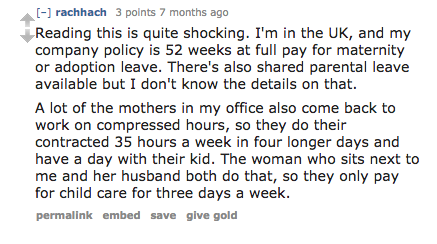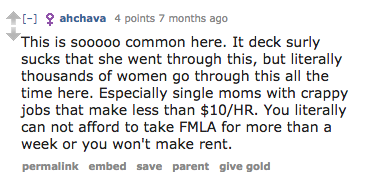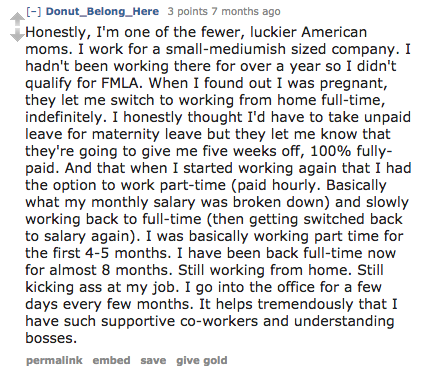Relationships March 28, 2017


Although the United States is considered one of the wealthiest nations in the world, it’s the only industrialized country that does NOT provide government-mandated paid parental leave.
The 1993 Family and Medical Leave Act (FMLA) requires companies with 50 or more employees to give at least twelve weeks of unpaid leave to new mothers who have worked for over one year and 1,250 hours. Unfortunately, twelve weeks of unpaid leave isn’t enough. And, although individual states can require a more comprehensive maternity plan, only California, New Jersey and Rhode Island currently offer paid and medical leave. In fact, eighty-eight percent of American women do not get paid benefits after they give birth…which becomes even more troubling when compared to leave policies in other countries.
RELATED: How to Plan Ahead for Maternity Leave
To find out what big-name companies offer the most parental leave, ENTITY did some digital sleuthing and reached out to Lauren Wallenstein, founder of Milk Your Benefits, a consulting business that helps new parents “milk” their parental leave benefits.
Here’s what you should know about the parental leave policies of the five largest public and five largest private companies in the U.S.
Public companies – including the largest five public companies in the U.S. (as listed by Forbes) – seem to have more transparent parental leave policies than private companies. Large companies like these also often offer longer leave because “your absence is more felt the smaller the company is,” according to Wallenstein.
So do these large companies come with large benefits? Keep reading to find out.
Berkshire Hathaway may be a public company, but that seems to mean little when it comes to parental leave. The New York Times and The New Republic have both attempted to contact the company about their parental leave, but were either ignored or told Berkshire wasn’t interested in being interviewed. Berkshire Hathaway’s website suggests the company only meets FMLA and state requirements. Like in other companies, Berkshire Hathaway employees may use paid sick time or short term disability to pay for part of their maternity leave. One female employee took five weeks paid leave, according to her review on FairyGodBoss (a website that measures how female friendly a company is based on employee reviews).
RELATED: How to Support Your Coworker Before She Goes on Maternity Leave
In January of 2016, JP Morgan announced that it would extend paid maternity leave from 12 to 16 weeks for all primary caregivers. Non primary caregivers also had their leave extended from one week to two weeks, according to Business Insider.
Wells Fargo announced in April of 2016 that it would give 16 weeks of paid parental leave to primary caregiver employees and four weeks to non-primary caregivers. The leave policy applies to all full and part time employees and is applicable to births, adoptions and foster children, according to the 2017 Wells Fargo Team Member Handbook.
This was the first time Wells Fargo provided paid leave, and Wallenstein says policy changes like Fargo’s reflect that “employers are much more aware of the fact that new parents want scheduling flexibility and as much income as possible during their leaves.” As a result, Wallenstein explains: “I am seeing more large and moderate-sized employers drafting leave policies that guarantee income for a finite period of time.”
If you’re planning on having kids while working in the tech industry, set your sights on Apple! Back in 2014, Apple paved the way for other companies by announcing that expectant mothers could receive four weeks paid leave before their due date and 14 weeks paid leave after giving birth. Expectant fathers and non-birth parents are also given six weeks paid leave.


Via Reddit
ExxonMobil is another company that refused to talk to The New York Times or The New Republic about its parental leave policies. According to the 2014 ExxonMobil Disability Plan, paid maternity leave is available under short term disability for the length that you are disabled for. ExxonMobil’s policies are especially “pathetic” (in the words of the New Republic) since the company is worth $32 billion, as of 2016.
RELATED: Why Subtle Sexism Towards Working Women Needs to End
To figure out the parental leave plan of the five largest private companies in the U.S. (as listed by Forbes), ENTITY included feedback from anonymous reviews. Keep in mind that the information in these reviews might depend on a single position or location, and not fully reflect company policy.
Cargill does not list an official maternity policy, but Maybrooks, a website dedicated to providing company information to working mothers, reports that Cargill offers 12 weeks of paid maternity leave and six weeks of paid paternity leave. Under employee benefits on their website, Cargill also lists adoption assistance.


Via Reddit
There’s no record online of any Koch Industries parental leave policy. Most Glassdoor reviews report that Koch offers generally good benefits, and the two reviewers on FairyGodBoss say they were treated equally as women. One review claimed there was no maternity leave other than 12 unpaid weeks mandated by FMLA. The reviewer instead used her vacation time and short term disability insurance. On its website, Koch states that specific benefits vary by company.
Lack of employee education on parental leave policies – as seen with Koch and other mentioned companies – is a common challenge for new working parents. “My business exists to aid those who feel they’ve either haven’t been given all relevant leave information or for people who just don’t understand what they’ve been told,” Wallenstein explains.
RELATED: Baby Fever Signs: How To Know When It’s The Right Time
In 2013, Albertsons was sued by one employee who claimed the company’s refusal to “accommodate her pregnancy-related disabilities” led to death of her newborn daughter. This appears to be an isolated incident and doesn’t directly relate to parental leave; however, whether the company improved its treatment of pregnant women is still uncertain. One 2015 review on Glassdoor reported that Albertsons gave parental leave if the parents requested it. However, this leave is unpaid.


Via Reddit
At first glance, Dell’s parental leave policy doesn’t seem too special. Most women on FairyGodBoss report having six weeks paid leave and seven weeks unpaid. As of 2017, Dell offers 12 weeks of disability and family/medical leave, according to Fast Company. However, Dell employees also receive “bonuses” like 24/7 access to a trained labor and delivery nurse hotline, lactation rooms and support services, on-site childcare and adoption assistance.
For Sarah Luden, a Dell global communications consultant, the best part of Dell’s maternity leave is the help she received in planning her transition back to work. As Wallenstein points out, “The vast majority of HR professionals don’t understand that it is their job to ensure a smooth transition for their employees both in and out of the workplace during leaves of absence.” Apparently, Dell is one of the exceptions – and a good one at that!


Via Reddit
Unlike some other companies, PWC clearly lists its parental leave policies on its website. PWC gives all parents six weeks of fully paid leave, and parents also may be eligible for 6 to 8 weeks of short term disability assistance. One unique bonus? Parents who have more than one child at a time get an additional two weeks off.
RELATED: How Working Remotely Helps Moms Keep Rockin’ Their Careers
The truth is, paid parental leave doesn’t just benefit the parents who take it; it also helps businesses’ bottom lines. In fact, research has found that new mothers who take paid leave are more likely to be back at work within nine to twelve months than mothers who don’t take any leave. First-time mothers who receive paid leave are also more likely to come back to work at all – which saves businesses the time and money spend to find a replacement.
So, when companies like JP Morgan or Apple improve their parental leave policies, it’s not just the “right” way to treat new parents – it’s also a smart business move that corporations like Berkshire, ExxonMobil and Albertsons should consider.
Once more companies begin to embrace paid parental leave and all the benefits that come along with it, perhaps the “American dream” of having a family while kicking booty at work can really come true for women everywhere.